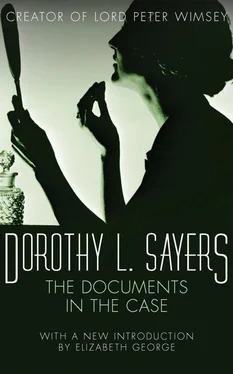Dorothy Sayers - The Documents in the Case
Здесь есть возможность читать онлайн «Dorothy Sayers - The Documents in the Case» весь текст электронной книги совершенно бесплатно (целиком полную версию без сокращений). В некоторых случаях можно слушать аудио, скачать через торрент в формате fb2 и присутствует краткое содержание. Жанр: Классический детектив, на английском языке. Описание произведения, (предисловие) а так же отзывы посетителей доступны на портале библиотеки ЛибКат.
- Название:The Documents in the Case
- Автор:
- Жанр:
- Год:неизвестен
- ISBN:нет данных
- Рейтинг книги:5 / 5. Голосов: 1
-
Избранное:Добавить в избранное
- Отзывы:
-
Ваша оценка:
- 100
- 1
- 2
- 3
- 4
- 5
The Documents in the Case: краткое содержание, описание и аннотация
Предлагаем к чтению аннотацию, описание, краткое содержание или предисловие (зависит от того, что написал сам автор книги «The Documents in the Case»). Если вы не нашли необходимую информацию о книге — напишите в комментариях, мы постараемся отыскать её.
The Documents in the Case — читать онлайн бесплатно полную книгу (весь текст) целиком
Ниже представлен текст книги, разбитый по страницам. Система сохранения места последней прочитанной страницы, позволяет с удобством читать онлайн бесплатно книгу «The Documents in the Case», без необходимости каждый раз заново искать на чём Вы остановились. Поставьте закладку, и сможете в любой момент перейти на страницу, на которой закончили чтение.
Интервал:
Закладка:
I knew that all the foodstuffs in ‘The Shack’ had been carefully analysed and found harmless, with the exception of the half-eaten dish of fungi itself. I was, therefore, forced to conclude that the poison had been added to the beef stock in which the fungi were stewed. Anything else would be dangerous, for the presence of muscarine in, say, the salt or the coffee would be a circumstance so suspicious as to impress even the coroner’s jury.
There was nothing difficult about this. The stock would have been prepared from Monday’s delivery of shin of beef. It was my father’s habit always to keep a pan of stock simmering on the hob. By Thursday morning there would probably be just sufficient left to cook his evening meal, after which he would boil up the new supply of shin for the rest of the week.
Now, in what form would the poison have been added? Not in the solid form, for my father would have noticed the presence of fungi in his stock. But a teacupful of poisonous liquid might easily have been poured in at any moment. I was, therefore, brought back to my previous idea that Lathom managed to procure the Amanita muscaria and decoct the poison during my father’s absence from the hut.
But how I was ever to prove this, I did not know. I had plenty of evidence of motive and opportunity, but nothing that could put the crime beyond any reasonable doubt in the minds of twelve good and true jury-members. And besides, I was by no means satisfied of Lathom’s ability to identify Amanita muscaria with certainty. Was there no easier and more reliable method by which he might have obtained the stuff? Was it possible, for instance, to buy muscarine? If so, and if one could trace the sale to Lathom, there would be genuine evidence of criminal intent. For what innocent reason could an artist require muscarine?
The difficulties of the thing stared me in the face. Even if muscarine was procurable commercially (which I thought very unlikely, for, so far as I know, it has no medicinal use), it was impossible for me, as a private individual, to broadcast an investigation among all the chemists in the country. Only the police could do that, and I could not set the police to work without producing the very evidence which was the object of the search. There were not only chemists — there were all the research laboratories, too. The thing seemed hopeless.
At this point the word ‘laboratories’ struck a chord in my mind. Had not there been something in the Munting correspondence about a laboratory?
I had not paid much attention to the passage when I first read it, because my mind had been taken up with the idea of Lathom’s having gathered the fungi on the spot And, indeed, the facts had been so buried in a lot of vague twaddle about the origin of life and other futile Muntingesque speculations that I had skimmed the pages over in disgust, but when I turned back to the letter I cursed myself for not having given it fuller consideration before.
Two facts emerged very clearly from the welter of surrounding nonsense:
1. That Lathom had been shown a collection of poisons, apparently kept where anybody could easily get at them; and
2. That Leader had drawn the special attention of the party to certain synthetic, or laboratory-made poisons, indistinguishable by analysis from natural vegetable products.
Here at last was something definite. Supposing that a bottle of muscarine had by any chance formed part of the collection, what was easier than for Lathom to have helped himself to it?’
I did not know whether it was possible for an outside person to penetrate the laboratories of St Anthony’s College unchallenged, but this I could easily find out by the simple process of going there. Probably I should only have to ask to see some doctor or student. Lathom, for instance, could have asked to see this man Leader, whom he already knew. Leader might very well be able to give us some help in the matter. Munting was my point of contact with Leader, and the next step was obviously to go round and get a note of introduction.
Munting, of course, showed great unwillingness to interfere in the matter. His interview with Lathom seemed to have upset him badly. At length, however, I persuaded him that he had a duty in the matter.
‘If you refuse to help me,’ I said, ‘and I am able to prove the murder, you will be something very like an accessory after the fact.’
Mrs Munting, who, in practical common sense, is worth ten of her husband, agreed with this point of view.
‘It would be very unpleasant if you got into trouble about it, Jack. I do think if Mr Lathom really has done this dreadful thing, you oughtn’t to stand in the way of getting it found out. A man like that is very dangerous. And they say that when a poisoner has once committed a murder and got away with it, he is very likely to try it again. It might be you or young Mr Harrison next time.’
‘Do you really think so?’ he muttered unhappily.
‘I do. And oh, Jack! Do think of the awful cruelty of letting that poor man die such a painful, lingering death, all alone in that place, without a soul to come near him. Anyone who could do that would be an absolute monster. I don’t care what excuse he had.’
‘That’s been haunting me,’ said Munting — and he did look very white and ill. ‘All right, Harrison. I’ll see it through. Look here, I’ll come along to the place with you.’
We walked in complete silence till we came to St Anthony’s. There were numbers of people passing in and out through the wide entrance, and nobody took the slightest notice of us.
‘I think the labs are up this staircase,’ said Munting, leading the way. ‘And here’s where we hang up the hats and coats,’ he added, rattling his umbrella into a hat-stand placed inside the heavy swinging door.
‘Is that usual?’ I inquired.
‘We did it last time,’ said Munting, ‘I remember it distinctly. And as the idea is to see whether it’s feasible to roam unchallenged about the place, we may as well look as much like the inhabitants as possible. If Lathom did come here poison-hunting, he’d scarcely omit that precaution.’
Having thus shed the outward insignia of visitors, we found ourselves in a wide corridor, smelling faintly of chemists’ shops, with numbered doors on either side. A few men in white overalls passed us, but took no notice of us. We walked briskly, as though with a definite objective, and, selecting at random a door near the end of the corridor, pushed it boldly open.
A big room, full of sinks and tables and well-lit by large windows, presented itself to our view. A student sat at a bench near us with his back to the door. He was boiling something in a complicated apparatus of glass tubes over a Bunsen burner. He did not look up. Over by the window four men were gathered round some sort of experiment, which apparently absorbed all their attention. A sixth man, mounted on a pair of steps, was searching for something in a cupboard. He glanced round as we entered, but, seeing that we did not look likely to assist him in finding what he wanted, ignored us, and, coming down, went up to the student with the apparatus.
‘What’s become of. .?’ (something I didn’t catch) he asked irritably.
‘How should I know?’ demanded the other, who was pouring some liquid into a funnel and seemed annoyed at the interruption. ‘Ask Griggs.’
We backed out again, unregarded, and tried another door. Here we found a small room, with a solitary, elderly man bending over a microscope. He removed his eye from the lens and looked round with a scowl. We begged his pardon and retired. Before we had closed the door, his head was back at the eyepiece again, while his right hand, which had never stopped writing, continued to take notes.
We intruded, with equal ease and equally unchallenged, into a lecture-room, where forty or fifty students were gathered round a demonstrator at a blackboard; into two more laboratories, one empty and the other containing two absorbed men and a dead rabbit, and finally into a fourth laboratory, where a dozen or so students were laughing and talking and seemed to be waiting for somebody.
Читать дальшеИнтервал:
Закладка:
Похожие книги на «The Documents in the Case»
Представляем Вашему вниманию похожие книги на «The Documents in the Case» списком для выбора. Мы отобрали схожую по названию и смыслу литературу в надежде предоставить читателям больше вариантов отыскать новые, интересные, ещё непрочитанные произведения.
Обсуждение, отзывы о книге «The Documents in the Case» и просто собственные мнения читателей. Оставьте ваши комментарии, напишите, что Вы думаете о произведении, его смысле или главных героях. Укажите что конкретно понравилось, а что нет, и почему Вы так считаете.












